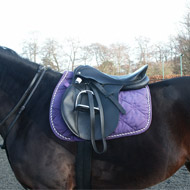
AHT study strongly suggests that saddle fit should be checked regularly
A study conducted by the Equine Centre of the Animal Health Trust (AHT) has concluded that ill-fitting saddles are not only associated with back muscle asymmetry, a stilted gait and back pain in the horse, but they are also associated with back pain in the rider. The results strongly suggest that saddle fit should be checked regularly and that riders and trainers should be encouraged to learn how to identify ill-fitting saddles.
Supported by World Horse Welfare, the study was conducted by Dr Sue Dyson, head of clinical orthopaedics at the Centre for Equine Studies at the AHT, and Line Greve, PhD student at the AHT.
A clinical assessment of the horse and rider was performed and data was subsequently obtained from the same riders via an online questionnaire, without the riders being aware of the link between the two initiatives. The horses were selected from a variety of work disciplines, were in regular work and were presumed by their riders or owners to be sound.
Line Greve said: “Ideally saddle fit should be checked more often than once a year to reduce the instances of ill-fitting saddles, yet this isn’t the whole solution because worryingly, 30 per cent of horses that had their saddles checked at least once yearly still had an ill-fitting saddle. What is unknown is whether these saddles had ever fitted correctly or whether a properly qualified saddle fitter was responsible for the fitting. It can only be of benefit for riders, trainers and other associated professionals to become more educated about the complexity of the links between lameness, saddle slip, ill-fitting saddles and rider crookedness.”
The results will be presented at the second Saddle Research Trust International Conference, to be held in Cambridge on November 29, 2014 at Anglia Ruskin University. For more information visit www.saddleresearchtrust.com.



 The Animal and Plant Health Agency (APHA) has updated its online reporting service for dead wild birds.
The Animal and Plant Health Agency (APHA) has updated its online reporting service for dead wild birds.